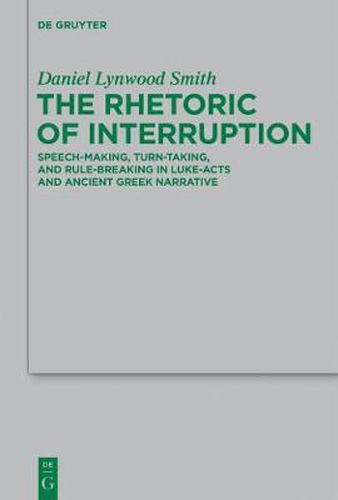Readings Newsletter
Become a Readings Member to make your shopping experience even easier.
Sign in or sign up for free!
You’re not far away from qualifying for FREE standard shipping within Australia
You’ve qualified for FREE standard shipping within Australia
The cart is loading…






This title is printed to order. This book may have been self-published. If so, we cannot guarantee the quality of the content. In the main most books will have gone through the editing process however some may not. We therefore suggest that you be aware of this before ordering this book. If in doubt check either the author or publisher’s details as we are unable to accept any returns unless they are faulty. Please contact us if you have any questions.
Why are so many speakers interrupted in Luke and in Acts? For nearly a century, scholars have noted the presence of interrupted speech in the Acts of the Apostles, but explanations of its function have been limited and often contradictory. A more effective approach involves grounding the analysis of Luke-Acts within a larger understanding of how interruption functions in a wide variety of literary settings. An extensive survey of ancient Greek narratives (epics, histories, and novels) reveals the forms, frequency, and functions of interruption in Greek authors who lived and wrote between the eighth-century B.C.E. and the second-century C.E. This comparative study suggests that the frequent interruptions of Jesus and his followers in Luke 4:28; Acts 4:1; 7:54-57; 13:48; etc., are designed both to highlight the pivotal closing words of the discourses and to draw attention to the ways in which the early Christian gospel was received. In the end, the interrupted discourses are best understood not as historical accidents, but as rhetorical exclamation points intended to highlight key elements of the early Christian message and their varied reception by Jews and Gentiles.
$9.00 standard shipping within Australia
FREE standard shipping within Australia for orders over $100.00
Express & International shipping calculated at checkout
This title is printed to order. This book may have been self-published. If so, we cannot guarantee the quality of the content. In the main most books will have gone through the editing process however some may not. We therefore suggest that you be aware of this before ordering this book. If in doubt check either the author or publisher’s details as we are unable to accept any returns unless they are faulty. Please contact us if you have any questions.
Why are so many speakers interrupted in Luke and in Acts? For nearly a century, scholars have noted the presence of interrupted speech in the Acts of the Apostles, but explanations of its function have been limited and often contradictory. A more effective approach involves grounding the analysis of Luke-Acts within a larger understanding of how interruption functions in a wide variety of literary settings. An extensive survey of ancient Greek narratives (epics, histories, and novels) reveals the forms, frequency, and functions of interruption in Greek authors who lived and wrote between the eighth-century B.C.E. and the second-century C.E. This comparative study suggests that the frequent interruptions of Jesus and his followers in Luke 4:28; Acts 4:1; 7:54-57; 13:48; etc., are designed both to highlight the pivotal closing words of the discourses and to draw attention to the ways in which the early Christian gospel was received. In the end, the interrupted discourses are best understood not as historical accidents, but as rhetorical exclamation points intended to highlight key elements of the early Christian message and their varied reception by Jews and Gentiles.